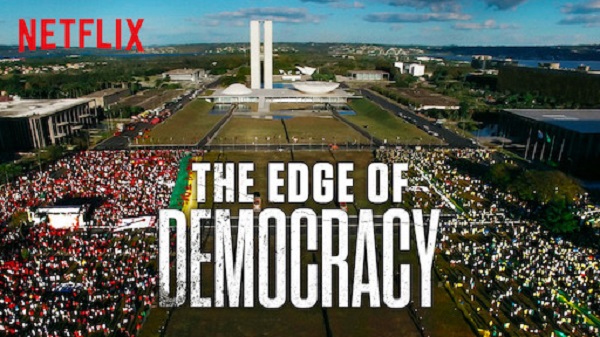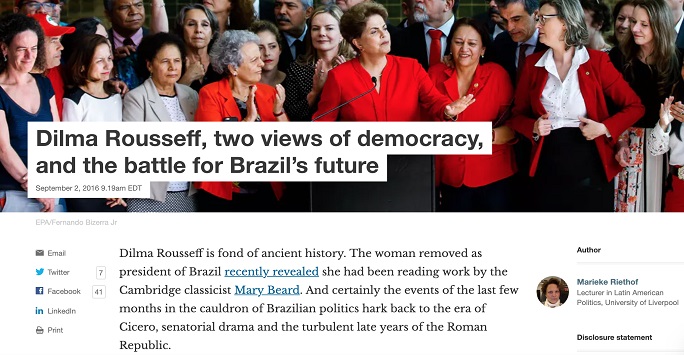“The Edge of Democracy”: Explaining Brazil’s political crisis
Posted on: 27 June 2019 by Marieke Riethof in 2019 posts

Our Latin American politics expert, Dr Marieke Riethof, discusses the latest news in Brazilian politics in light of a new documentary on Brazil, “The Edge of Democracy” (directed by Petra Costa, 2019, available on Netflix).
In 2016, Brazil’s first female president, Dilma Rousseff, was impeached, following heated debates that went to the heart of the country’s fragile democracy. The documentary focuses on this turbulent period, explaining the causes of the political crisis. One of these causes were the mass demonstrations that started in 2013, initially as a demand for more government spending on education, health and other social services. In 2015, the protests turned against President Dilma’s government and corruption, including calls for her and her predecessor Luis Inácio Lula da Silva to be jailed. These events signalled Brazil’s increasing political polarization fuelled by the public’s dissatisfaction and even anger at politicians. What is particularly effective in the documentary is how the scenes are cut to illustrate this polarization. In a telling scene, we see members of Brazil’s Congress holding signs in favour of impeachment and others in favour of democracy, indicating fundamentally different – and perhaps irreconcilable perspectives – on what democracy means today.

“Democracy is nothing but a short-lived dream”
Another strength is that the documentary does not pretend to be neutral in its depiction of recent events in Brazilian politics. The story of impeachment is interwoven with the director Petra Costa’s personal perspectives and family history. Like Dilma Rousseff, the director’s parents were victims of Brazil’s military dictatorship (1964-1985). The scenes in which Costa’s mother meets Dilma to discuss their experiences are another powerful reminder of the fragility of the country’s democratic culture and its dark past. Another connection to Brazil’s recent history is the role of the labour movement an end to the dictatorship through large-scale strikes in the late 1970s and 1980s. Former President Luis Inácio Lula da Silva’s roots were in the trade union movement in this period, which turned workers into legitimate political actors, as I also discuss in my recent book (Labour Mobilization, Politics and Globalization in Brazil: Between Militancy and Moderation, 2019). The documentary opens and ends with Lula’s arrest at the Metalworkers’ Union headquarters in São Paulo in 2018, surrounded by his supporters in a highly symbolic place for Brazil’s transition to democracy.
The story has not finished with Lula’s imprisonment. The grounds for his conviction on corruption charges are in question, as recent leaks from the anti-corruption task force (Operation Car Wash) suggest evidence of collusion between the judge in charge and the prosecutors. Due to his conviction, Lula was also excluded from the 2018 presidential race, leading to far-right politician Jair Bolsonaro’s victory.
Discover more
- Read Marieke’s latest media article: Brazil’s crumbling political culture laid bare as impartiality of Operation Car Wash judge questioned.
- Listen to Marieke’s interview on the 2018 presidential elections on The Briefing Room (BBC Radio 4)
- Watch the trailer for "The Edge of Democracy" by Petra Costas.
Keywords: Brazil , democracy , documentary , political , culture , research, Latin America.